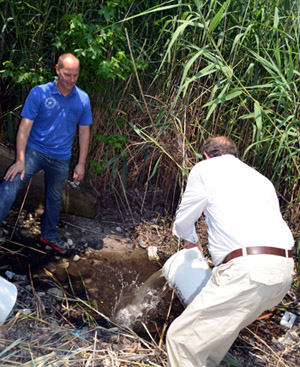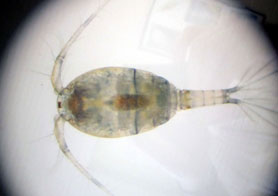For Immediate Release: June 22, 2012
Contact: Lynne Richmond
(609) 633-2954
Lawrence Ragonese
(609) 292-2994 DEP
(CAPE MAY) – With conditions ripe for mosquito breeding in standing water around New Jersey, the Departments of Agriculture and Environmental Protection are once again teaming up to release a tiny, shrimp-like crustacean with a hearty appetite for mosquito larvae.
Macrocyclops albidus, commonly known as copepods, is being bred in large numbers at the Department of Agriculture’s Philip Alampi Beneficial Insect Rearing Laboratory in West Trenton, and is one tool used by the DEP’s Mosquito Control Program to fight disease-spreading mosquitoes. New Jersey Secretary of Agriculture Douglas Fisher and Bob Kent, administrator of DEP’s Office of Mosquito Control Coordination visited Cape May County today to see a release of the copepods into a small pool.

Peter Bosak, Superintendent of the Cape May County Department of Mosquito Control and Secretary Fisher release copepods into standing water on Middle Township school property.
“This is the second season the copepod program is in full swing, demonstrating the successful partnership between NJDA, NJDEP and the counties against a common enemy – the mosquito,” said Secretary Fisher. “This effort is important to agriculture because mosquito-borne diseases such as Eastern Equine Encephalitis and West Nile Virus can be deadly to horses.”
New Jersey has already had one case of Eastern Equine Encephalitis (EEE) this season – a 3-year-old horse from Burlington County was euthanized in May after contracting the disease. Last year, the one and only case of EEE occurred in October.
Kent said it has been an early and nasty mosquito season so far. Intermittent rain followed by drying and then more rainfall has led to the creation of many micro habitats for mosquitoes, such as wheelbarrows, gutters, boat tarps and flower pots, which presents a statewide problem.
The copepods thrive in fresh water and are a valuable tool in battling mosquitoes in artificial containers, roadside ditches, small water pools, clogged downspouts and other, smaller wet areas that can breed plenty of mosquitoes. They are especially helpful tools in fighting mosquitoes near schools, where it pesticide use is prohibited.
DEP’s pesticide-free mosquito fighting program also employs the use of several small fish with an appetite for mosquito larvae. Gambusia affinis, or mosquitofish, and fathead minnows, freshwater killfish and bluegill sunfish have been stocked in many lakes and ponds statewide.
"The use of these biological control agents is but one small part of our statewide integrated approach to mosquito control” said Kent. “The state's assistance to county mosquito control programs helps reduce their dependence on insecticides, providing them a variety of natural tools to help deal with mosquito issues. The partnership between state agencies and county government is paramount to successfully dealing with mosquito infestations."
The Cape May County Department of Mosquito Control has been in existence since 1915. It manages mosquito populations using an integrated control approach, stressing environmental safety, economics, efficacy, research and surveillance in order to protect the health and welfare of county residents and the many tourists who visit during the months mosquitoes are active. Cape May is one of 11 counties this year participating in the copepod program.
For more information on the State’s mosquito programs, visit:
www.nj.gov/dep/mosquito/programs.htm
Fpr tips on reducing mosquito activities around your home this spring and summer, visit: www.nj.gov/dep/mosquito/owners.htm
For more information on the State Department of Agriculture’s Phillip Alampi Beneficial Insect Rearing Laboratory, visit:
www.nj.gov/agriculture/divisions/pi/prog/beneficialinsect.html



